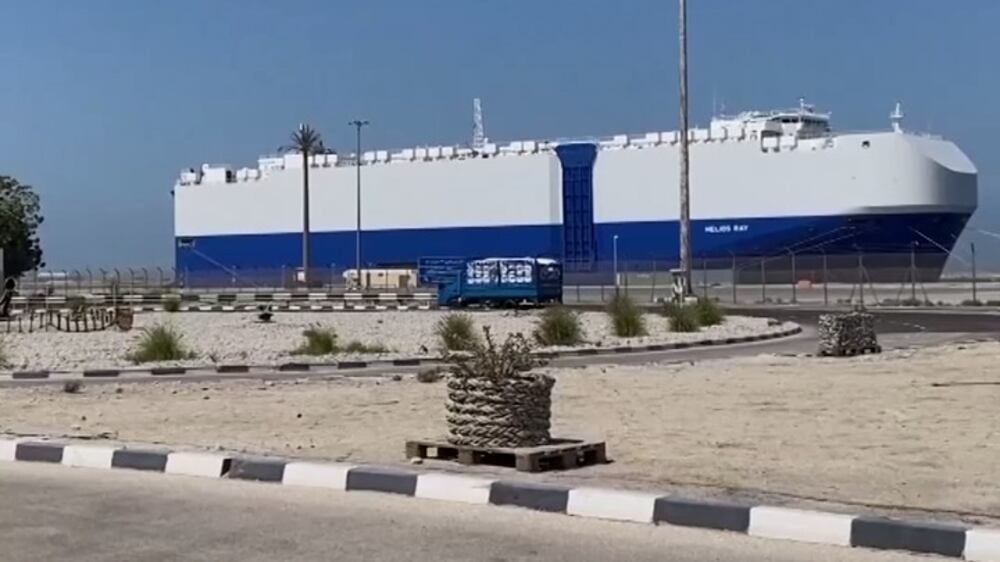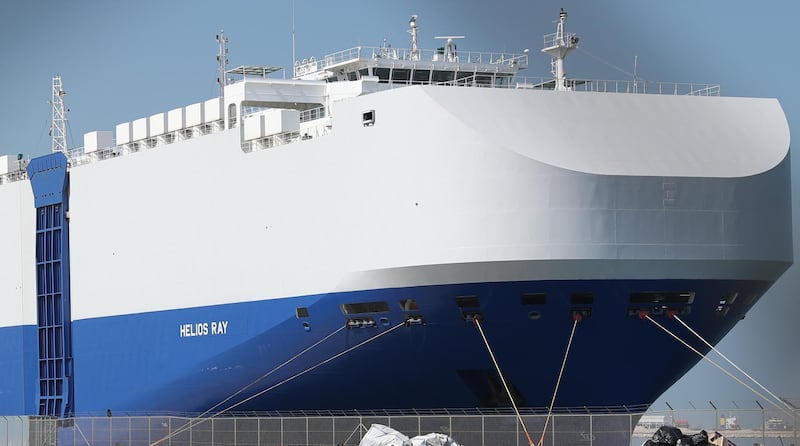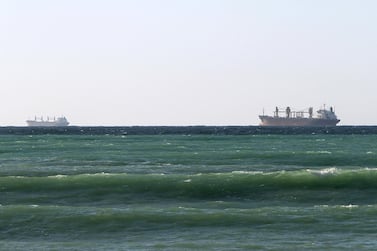Latest: Netanyahu says Iran 'definitely behind' limpet mine attack on ship
An Israeli-owned cargo ship hit by unexplained explosions in the Gulf of Oman arrived in Dubai's main port for repairs on Sunday.
The MV Helios Ray was in dry dock at Port Rashid.
Israeli-owned ship hit by explosion arrives in Dubai

The crew was unharmed in the blast on Friday, but the vessel was holed twice on both sides just above the waterline, according to American defence officials.
It was unclear what caused the damage, but on Saturday Israeli Defence Minister Benny Gantz told public broadcaster KAN that Iran was a suspect.
“We will need to keep investigating, but we can say for sure that Iran is attempting to damage Israeli infrastructure and to hurt Israeli citizens,” Mr Gantz said.
The ship’s proximity to Iran at the time further led to suspicions against Tehran, which has been accused of limpet mine attacks on commercial vessels.
The incident came as tension between the US and Iran increased over the unraveling of 2015 nuclear deal.
Tehran has tried to pressure President Joe Biden’s administration into granting the sanctions relief it received under the accord with six world powers that former President Donald Trump abandoned.
From the shore, damage to the vessel was not clear to see. The dock blocked the view of the vessel's starboard side down to the waterline and the port side could only be seen from a distance.
The ship was anchored near Dubai's floating hotel, the Queen Elizabeth 2.
Friday's blast on the ship, a Bahamian-flagged roll-on, roll-off vehicle cargo vessel, recalled a string of attacks on foreign oil tankers in 2019 that the US Navy blamed on Iran. Tehran denied any role in the suspected assaults, which happened near the Strait of Hormuz, a passageway for a fifth of all oil traded worldwide.
Various photos circulating of the damage to the HELIOS RAY corroborate reports from two U.S. defence officials cited by AP of two holes in the port and starboard sides of the vessel (four total), just above the waterline. Signage shows damage at deck 3 level. pic.twitter.com/5PweU95UxT
— Ambrey Intelligence (@Ambrey_Intel) February 26, 2021
Israeli ambassador to the US and UN, Gilad Erdan, told Israel's Army Radio on Sunday that “it was no secret that the Iranians are trying to harm Israeli targets", alleging the explosion on the ship bore the hallmarks of other Iranian attacks.
The Helios Ray had offloaded cars at ports in the Gulf before making its way out of the Middle East toward Singapore.
The blast happened as the ship was sailing from the Saudi port Dammam out of the Gulf of Oman, forcing it to turn to Dubai for inspection.
Iranian authorities have not publicly commented on the ship.
The country's hard-line Kayhan daily newspaper, whose editor-in-chief was appointed by supreme leader Ayatollah Ali Khamenei, said the Helios Ray was possibly on an espionage mission in the region, without offering any evidence to support the claim.
The Sunday report speculated the ship may have been "trapped in an ambush by a branch of resistance axis”, referring to Iranian proxies in the region.
Iran also has blamed Israel for a recent series of attacks, including an explosion last summer that destroyed an advanced centrifuge assembly plant at its Natanz nuclear facility and the killing of Mohsen Fakhrizadeh, a leading Iranian scientist who founded the Islamic Republic's military nuclear programme two decades ago.
Iran’s repeated vows to avenge Fakhrizadeh’s killing have raised alarms in Israel, particularly as the Gulf sees an increase in Israeli traffic following the country's normalisation deals with the UAE and Bahrain.







